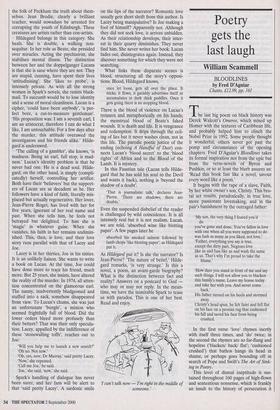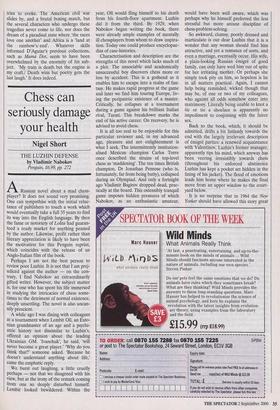Poetry gets the last laugh
William Scammell
BLOODLINES by Fred D'Aguiar Chatto, f12.99, pp. 161 The last big poem on black history was Derek Walcott's Omeros, which mixed up Homer with the textures of Caribbean life, and probably helped him to clinch the Nobel Prize in 1992. Some people thought it wonderful; others never got past the pomp and circumstance of the opening chapters. Fred D'Aguiar's Bloodlines takes its formal inspiration not from the epic but from the verse-novels of Byron and Pushkin, or so at least the blurb assures us: 'Read this book fast like a novel, savour every word like a poem.'
It begins with the rape of a slave, Faith, by her white owner's son, Christy. This bru- tal act results, paradoxically, in true love, more passionate lovemaking, and in the pair's banishment by the outraged father:
'My son, the very thing I feared you'd do you've gone and done. You've fallen in love with one when all you were supposed to do was fuck as many as you liked, not love.' 'Father, everything you say is true, except the dirty part. Negroes love like us and fuss like us and wash the same as us. That's why I'm proud to take the blame.'
'How dare you stand in front of me and say such things. I will not allow you to blacken this family's name. Leave my house today and take her with you. And never come back.'
His father turned on his heels and stormed away.
Christy's head spun, he felt faint and fell flat on his face on a persian rug that cushioned his fall and saved his face from being crushed.
In the first verse 'love' rhymes inertly with itself three times, and 'do' twice; in the second the rhymes are so far-flung and hopeless ('blacken/ back/ flat; 'cushioned crushed') that bathos hangs its head in shame, or perhaps goes bounding off in search of Pope and Swift's The Art of Sink- ing in Poetry.
This level of dismal ineptitude is sus- tained throughout 160 pages of high-flown and sententious nonsense, which is frankly an insult to the history of persecution it tries to evoke. The American civil war slides by, and a brutal boxing match, but the several characters who undergo these tragedies never come to life, nor does the dream of a paradisal state where 'the races love one another' and Africa is a 'land at the rainbow's/ end'. Whatever skills informed D'Aguiar's previous collections, such as Mama Dot, seem to have been overwhelmed by the enormity of his sub- ject. 'My train is death but the engine is my craft./ Death wins but poetry gets the last laugh.' It does indeed.



























































 Previous page
Previous page